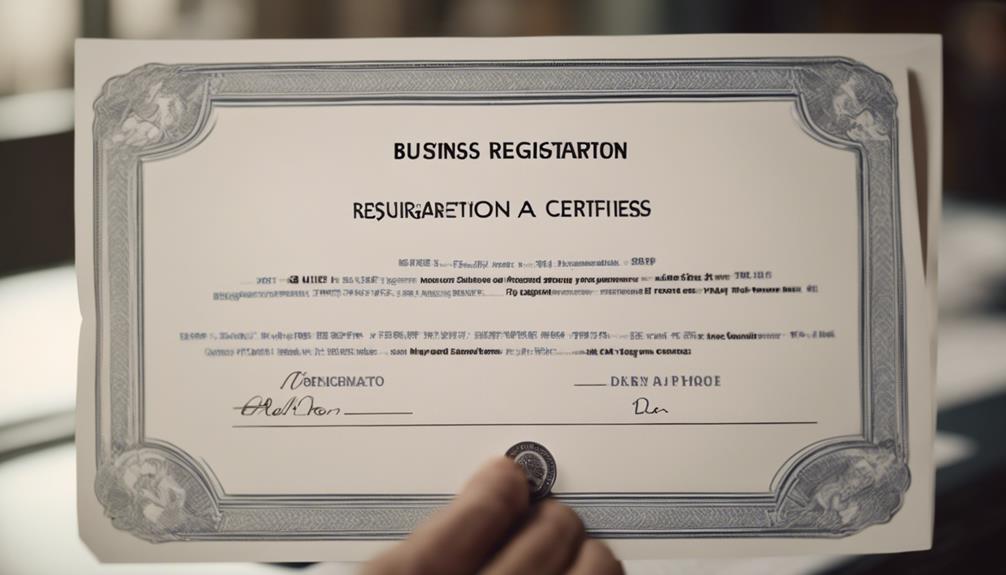So, you're ready to embark on your entrepreneurial journey, but where do you start?
The first step in establishing a successful US business involves navigating the intricate web of legal requirements. From selecting the right business structure to safeguarding your intellectual property, each decision lays the foundation for your venture's future.
But what are the five best legal steps you need to take to ensure your business's legality and protection?
Let's explore the key strategies that can set your business on the path to success and longevity.
Key Takeaways
- Choose a legal structure aligned with business goals for liability protection and tax benefits.
- Secure a unique business name, register it, and consider trademark protection.
- Register trademarks at state and federal levels to safeguard brand identity.
- Obtain necessary tax IDs like an EIN and comply with business regulations for legal operation.
Establishing a Legal Business Entity
When establishing a US business, your first crucial step is to choose a legal structure that best suits your needs and provides the necessary liability protection and tax benefits. Small businesses often opt for structures like Sole Proprietorship, Partnership, Limited Liability Company (LLC), or Corporation. Each comes with its own set of advantages and disadvantages concerning liability and tax obligations.
For instance, an LLC or Corporation can offer limited liability protection, safeguarding your personal assets in case of business debts or lawsuits. Registering your company by filing the required documents, such as Articles of Incorporation or Organization, with the state is essential to give your business legal recognition.
Understanding the tax implications associated with each legal structure is crucial. This knowledge enables you to make informed decisions that align with your business goals and financial strategies. By choosing the right legal name and structure for your business, you not only establish a solid foundation but also set yourself up for success in terms of liability protection and tax benefits.
Securing Your Business Name

To safeguard your business identity and prevent unauthorized use, securing your business name is a critical step in establishing legal protection and brand recognition. When choosing a name for your business, ensure it aligns with your brand image and values. Consider filing a Doing Business As (DBA) name if you operate under a different name than your legal entity. Before finalizing your business name, verify its availability to avoid conflicts with existing entities. Registering your business name at the state level not only solidifies your identity but also helps prevent unauthorized use by others. To further protect your brand, consider registering trademarks for your business name and logo designs. By taking these steps, you not only establish a strong legal foundation but also set the stage for successful branding and recognition.
| Aspect | Importance | Action |
|---|---|---|
| Legal Protection | High | Register |
| Branding | Essential | Trademarks |
| Availability | Crucial | Verify |
| Identity | Fundamental | State Level |
| Unauthorized Use | Preventive Measure | Secure |
Protecting Intellectual Property Assets
Protecting your intellectual property assets through trademark registration is a critical step in safeguarding your brand and creations. Registering trademarks for slogans and logos is crucial for ensuring that your unique identity is legally protected.
Conducting a thorough name search before applying for a trademark can help you avoid potential legal conflicts and ensure that your brand stands out in the market. By registering your trademarks with the U.S. Patent and Trademark Office, you can establish a strong foundation for brand protection, deterring others from using your intellectual property without permission.
Choosing a clear and memorable business name that reflects your brand essence is essential for intellectual property protection. To fully safeguard your business identity, it's important to register your trademarks at both state and federal levels.
Obtaining Necessary Tax IDs

Securing the necessary Tax IDs is a crucial step in establishing your US business and ensuring compliance with legal requirements. One key identifier you'll need is an Employer Identification Number (EIN), essential for businesses with employees and for tax purposes. The EIN not only helps you separate your business from personal liability but also provides legal protection. You can easily apply for an EIN online through the IRS EIN Assistant. Understanding different business structures is vital as it can affect your need for an EIN and your tax obligations. For independent contractors, self-employment (SE) tax is significant, as it is based on your business profits. By obtaining the necessary Tax IDs like an EIN, you not only fulfill your tax obligations but also safeguard your business and personal assets. Take the right steps to establish your business legally and protect yourself from potential financial risks.
| Tax IDs | Importance | How to Obtain |
|---|---|---|
| EIN | Essential for tax and legal protection | Apply online through IRS EIN Assistant |
| Business Structures | Impact EIN need and tax obligations | Understand different structures |
| SE Tax | Applicable for independent contractors | Based on business profits |
Ensuring Compliance With Business Regulations

Make sure your business is on the right side of the law by understanding and complying with essential regulations. To ensure legal compliance, it's crucial to obtain the necessary business licenses and permits from federal, state, and local regulatory authorities specific to your industry and location.
Research diligently to identify the industry-specific licenses and permits required for your business operations. By adhering to federal, state, and local licensing requirements, you not only prevent potential penalties but also guarantee the smooth and lawful operation of your business.
Stay vigilant about changes in regulations and licensing prerequisites, as non-compliance can have severe consequences. Seek guidance from legal counsel or regulatory authorities to clarify any uncertainties regarding permit and licensing obligations. Engaging with experts in the field can provide valuable insights and ensure that your business remains in good standing with the law.
Conclusion
You've laid the foundation for your US business with legal precision and foresight. Like a skilled architect, you've carefully crafted each step to ensure a solid structure.
Just as a building needs a strong foundation to withstand the test of time, your business is now equipped to weather any storm. By following these legal steps, you've built a fortress of protection and compliance that will stand tall in the competitive business landscape.
Congratulations on your journey to success!